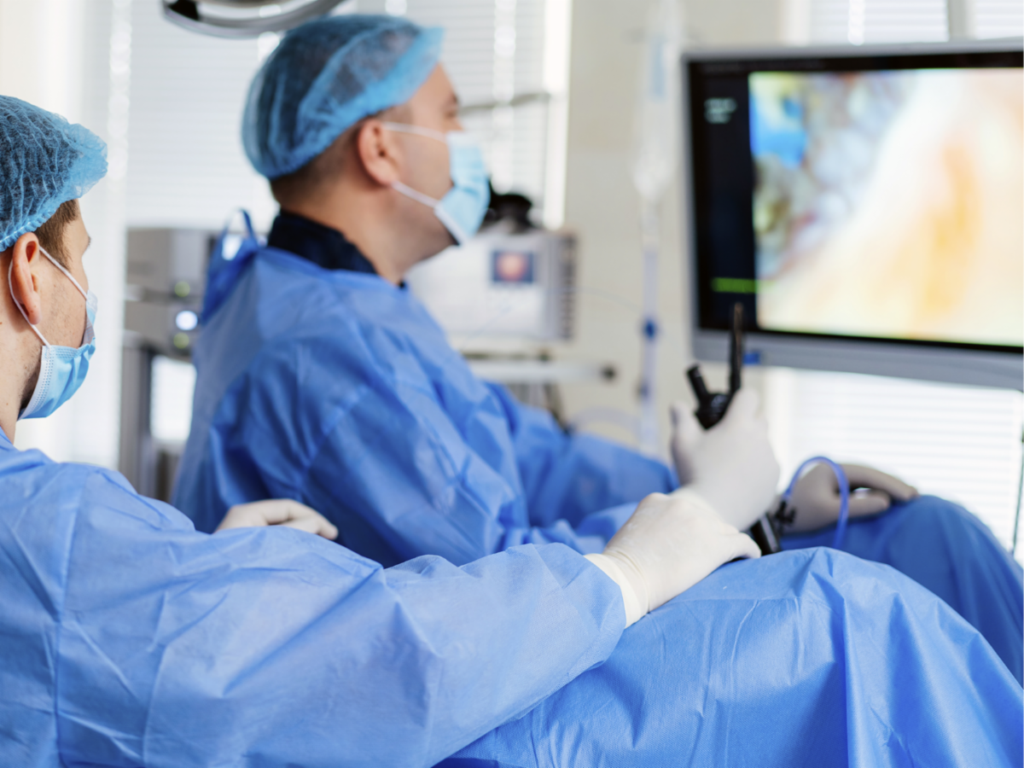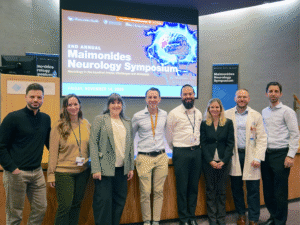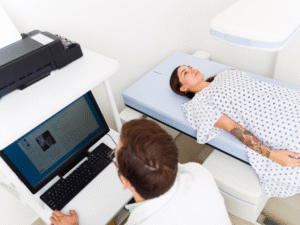Staffed by board-certified gastroenterologists, Maimonides Health’s Endoscopy Center offers Brooklyn’s physicians and residents the full spectrum of state-of-the-art advanced endoscopic services—all from the comfort of an easily accessible, Brooklyn-based facility.
Outfitted with the latest equipment and six dedicated procedure rooms, the modern facility sits across the street from Maimonides Medical Center. An underground pedestrian walkway conveniently connects the two facilities.
The center is the only site in Brooklyn focused exclusively on providing both routine and highly specialized endoscopic diagnostic procedures and treatments.
“Previously, many of these advanced services were not available in Brooklyn because they require very specific expertise,” says Ali Siddiqui, MD, Director of Endoscopy at Maimonides.
Multifaceted Endoscopic Expertise
Led by a team of expert endoscopists, Maimonides Endoscopy Center is fully equipped to meet patients’ complete endoscopic needs. Services can support patients dealing with a range of medical issues, from acid reflux disease, bile duct stones, or pancreatitis to gastroparesis and gastrointestinal (GI) cancers.
On-site providers include Dr. Siddiqui, an internationally respected interventional endoscopist who has written more than 350 articles and 11 books on advanced endoscopy. Yasutoshi Shiratori, MD, an advanced endoscopist, specializes intherapeutic endoscopy treatments for GI cancers.
Drawing on Dr. Siddiqui’s and Dr. Shiratori’s rich expertise together with the other GI faculty, the Endoscopy Center offers a full range of minimally invasive gastrointestinal diagnostic endoscopic services, such as:
- Colonoscopy
- Endoscopic ultrasound (EUS)
- Enteroscopy
- Esophagoscopy
- Flexible sigmoidoscopy
- Small bowel and double balloon enteroscopy
- Upper gastrointestinal (GI) endoscopy (EGD)
- Sedation-free, noninvasive video capsule evaluation of the small intestine
- Sedation-free, noninvasive video capsule evaluation of the esophagus and stomach: one of only a few centers around the country to offer this procedure
Center staff also offer a full range of highly specialized, minimally invasive treatments using endoscopic techniques, including:
- EndoCinch endoluminal gastroplication (ELGP) for treatment of gastroesophageal reflux disease (GERD) symptoms
- Endoscopic retrograde cholangiopancreatography (ERCP) for bile duct or pancreatic stent placement
- Endoscopic submucosal dissection (ESD), endoscopic mucosal resection (EMR), and endoscopic full-thickness resection (eFTR) to remove precancerous and cancerous growths from the GI tract
- Peroral endoscopic myotomy (POEM) for treatment of GI motility disorders, including esophageal POEM (E-POEM) to treat dysphagia and achalasia, gastric POEM (G-POEM) to treat gastroparesis, and Zenker’s diverticulum POEM (Z-POEM)
- EndoFLIP (Functional Lumen Imaging Probe) to diagnose esophageal motility disorders, is also available in conjunction with E-POEM
- EUS-guided fine-needle cytology to sample and stage lesions of the GI tract
- Gastroscopy for foreign body removal
- Interventional endoscopic ultrasound (I-EUS) for tissue biopsies, cyst drainage or targeted tumor treatments
- Polypectomy for colon polyp removal
- Sclerotherapy to control GI bleeding
Specialized GI Treatment Options
Because they are minimally invasive by nature—with most procedures using either no incisions or only very small ones—endoscopic procedures can unlock new treatment options for patients unable to tolerate standard surgeries.
“Endoscopic treatments offer a welcome alternative for patients too sick to be viable candidates for traditional surgery,” says Dr. Siddiqui.
As one of only a few dozen endoscopists practicing in the U.S. with specialty training in endoscopic submucosal dissection (ESD)—the use of an endoscope to remove precancerous and cancerous growths—Dr. Shiratori’s expertise opens new GI cancer treatment pathways that were previously not widely available to Brooklyn residents.
While ESD expertise is relatively common in Japan, where the technique originated, currently, only a handful of endoscopic centers in the U.S. have staff skilled in the procedure.
“Using ESD, we can precisely cut away and remove abnormal GI tissue, in one piece, without requiring the patient to face the complex incision and long recovery of a traditional abdominal surgery,” Dr. Shiratori says.
The minimally invasive advantages of endoscopic procedures are not limited to cancer patients. Dr. Siddiqui frequently utilizes his expertise in interventional endoscopic ultrasound (I-EUS) to treat bile duct or gall bladder obstructions in patients too ill for traditional surgeries, for example.
“Endoscopic procedures represent a feasible, less risky alternative to surgery, especially for very sick patients who would not be able to tolerate surgery,” he says.
To ensure Maimonides’ endoscopic care is accessible to all Brooklyn physicians and residents, the Endoscopy Center staff is equipped to provide seamless communication to all patients, including those whose native language is not English and those who are deaf or hearing impaired. Endoscopy Center staff work collaboratively with Maimonides’ teams of other departmental specialists—including oncologists, radiologists, and surgeons. Together, they create comprehensive care plans that maximize each patient’s health outcomes.
Services at the Endoscopy Center expand upon and complement the innovative GI treatments available at Maimonides, including at the recently opened Neurogastroenterology & Gastrointestinal Motility Center. The cutting-edge services available at both sites illustrate Maimonides’ commitment to creating invaluable health resources for Brooklyn, and providing the borough with accessible, world-class gastroenterological care.
To learn more or refer a patient, visit Maimonides’ Endoscopy Center or call (718) 283-7055. For more information on Maimonides Gastroenterology or to refer a patient, call (718) 283-5900.




